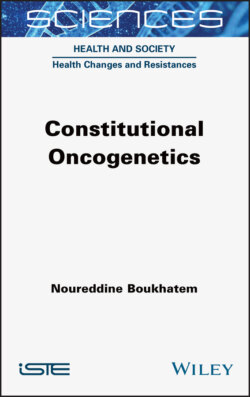Читать книгу Constitutional Oncogenetics - Noureddine Boukhatem - Страница 16
1.1. Introduction
ОглавлениеInherited cancer syndromes are characterized by germline genetic mutations, which are associated with a high risk of cancer development. These mutations are usually inherited in an autosomal dominant manner and often induce cancers at a relatively early age. Hereditary cancer syndromes are rare, accounting for only about 5–10% of all breast cancers.
In addition to hereditary breast and ovarian cancer (HBOC, BRCA1/BRCA2) syndrome, breast and ovarian cancers are components of several autosomal dominant cancer syndromes: Li–Fraumeni syndrome (TP53), Cowden syndrome (PTEN) and hereditary diffuse gastric cancer syndrome (CDH1). The risk of breast cancer is higher in people diagnosed with these syndromes and there is a risk of developing tumors in other organs.
Other genetic syndromes may include breast cancer as an associated trait: the heterozygous carriers of the deleterious mutations of the ATM gene (ataxia-telangiectasia) and the STK11 gene (Peutz–Jeghers syndrome).
Lynch syndrome (LS) is primarily associated with colorectal and endometrial cancer, although several studies have shown that patients with LS have a higher risk of developing breast cancer.
Ovarian cancer is also associated with LS and Gorlin syndrome.
Mutations in other genes are also associated with an increased risk of developing breast cancer (checkpoint kinase 2 [CHEK2], PALB2, NBN and BARD1) or ovarian cancer (BRCA1 interacting protein 1 [BRIP1], RAD51C and RAD51D).
Recent studies have shown that half of the pathogenic mutations identified in individuals who meet only the HBOC test criteria were in genes other than BRCA1/2. Similarly, half of the pathogenic mutations identified in individuals who meet only the criteria for LS testing were in genes that are not part of the LS predisposition genes.
These same studies have shown the usefulness of testing people suspected of developing or who have developed HBOC for a list of 25 genes (BRCA1, BRCA2, ATM, CHEK2, PALB2, NBN, BARD1, BRIP1, RAD51C, RAD51D, MLH1, MSH2, EPCAM, MSH6, PMS2, APC, MUTYH (biallelic), BMPR1A, SMAD4, TP53, PTEN, STK11, CDH1, CDKN2A and CDK4).
While MUTYH biallelic mutations are known to cause MYH polyposis-associated syndrome with a 28-fold increased risk of colorectal adenocarcinoma, monoallelic carriers have been reported to have only a slight increase in colorectal cancer risk (odds ratio of ~1.34), but together with an increased risk of breast cancer.
The most recent studies have confirmed the association of 15 genes with an increased risk (>2.0 times) of breast cancer (ATM, BARD1, BRCA1, BRCA2, CDH1, CDKN2A, CHEK2 (except p.I157T), MLH1, MSH2, MSH6, NF1, PALB2, PTEN, RAD51D and TP53). Eleven genes were associated with an increased risk (>2.0 times) of ovarian cancer (ATM, BRCA1, BRCA2, BRIP1, MSH2, MSH6, NBN, PMS2, RAD51C, RAD51D and TP53).
In this section, we will discuss the roles of BRCA1 and BRCA2 genes in predisposition to both breast and ovarian cancers; CHEK2, PALB2, NBN and BARD1 in predisposition to breast cancer; and BRIP1, RAD51C and RAD51D in predisposition to ovarian cancer.
